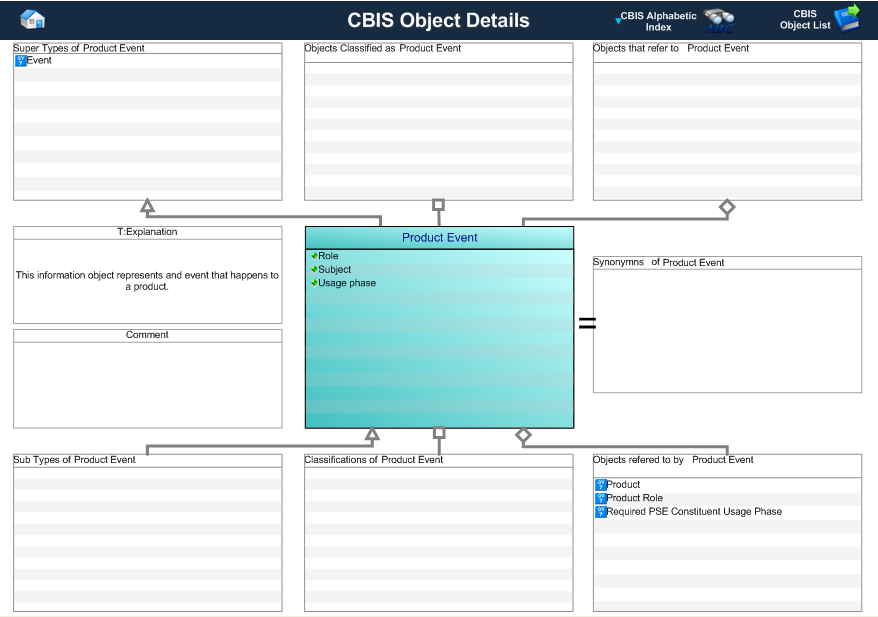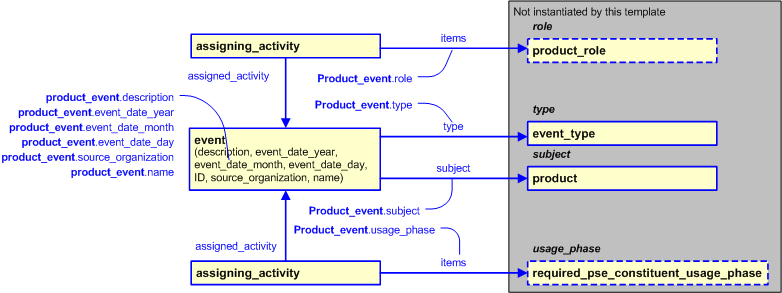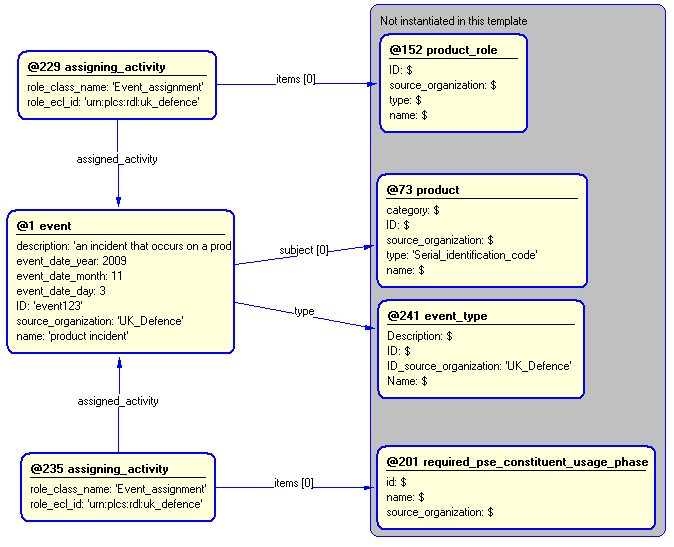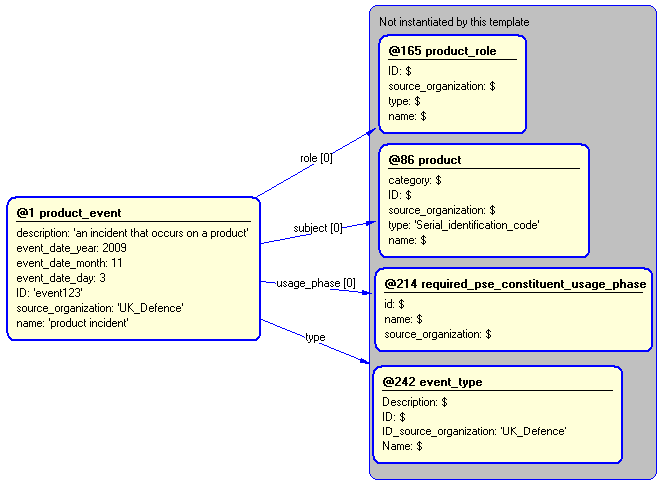Template:— product_event (prod_evnt)
Context:— UK_Defence |
Date: 2010/03/15 14:46:04
Revision: 1.4
|
This section specifies the template product_event.
NOTE
The template has been defined in the context of
UK_Defence.
Refer to the business context for details of related templates.
NOTE
An explanation of a template and the associated instantiation path is
provided in the
Template overview
section.
This template describes how to represent an event that happens to a product.
A Product event is an event that happens to a product.
This information object represents the information about a Product Event.
Figure 1 — A MOOD Business Architect representation of the Business Object: Product Event
The attributes of the Product Event object are tabled below.
|
Attribute name
|
Attribute description
|
Attribute type
|
Optionality
|
| Role |
This is the reference to the role that the product was performing when the event occurred. |
Relationship to Product Role |
Optional |
| Subject |
This is the reference to the item to which the event happens. Note, this constrains the inherited attribute to reference
Product.
|
Relationship to Product |
Mandatory |
| Usage Phase |
This is the reference to the usage phase of the product when the event occurred. |
Relationship to Required PSE Constituent Usage Phase |
Optional |
Table 1 — Product Event attribute details
The EXPRESS-G diagram in
Figure
2
shows the templates and EXPRESS entities that are required
to represent the template
"product_event".
The text highlighted in blue shows the template parameters.
Figure 2 — An EXPRESS-G representation of the Information model for product_event
The graphic for the template to be used in other EXPRESS-G diagrams
is shown in Figure
3
below.
Figure 3 — The graphical representation of the product_event template
The following input parameters are defined for this template:
This is the description of the event.
The year portion of the date at which the event occurred
The month portion of the date at which the event occurred.
The day portion of the date at which the event occurred.
This is the identifier of the event.
The organization that created the associated identifier. Additionally
a Person or Information System could be defined when either of these are the source; see Identifier template characterizations
name (Type='STRING', Optional)
This is the name of the event.
This is the reference to the Product to which the event happens.
This is the reference to the Product Role.
This is the reference to the Required PSE Constituent Usage Phase.
The following reference parameters are defined for this template:
Allow the
Activity_actual
entity instantiated in this path to be referenced when this template is used.
%^target = $product_event.event%
The instantiation path shown below specifies the entities that are to be
instantiated by the template.
A description of templates and the syntax for the instantiation path is
provided in the
Templates Help/Information section.
-- supertype Event /
event(
description=@description,
event_date_year=@event_date_year,
event_date_month=@event_date_month,
event_date_day=@event_date_day,
ID=@ID,
source_organization=@source_organization,
name=@name,
subject=@subject,
type=@type)/
%^event = $event.event%
-- role /
assigning_activity(
role_class_name='Event_assignment',
role_ecl_id='urn:plcs:rdl:uk_defence',
assigned_activity=^event,
items=@role)/
-- usage phase /
assigning_activity(
role_class_name='Event_assignment',
role_ecl_id='urn:plcs:rdl:uk_defence',
assigned_activity=^event,
items=@usage_phase)/
The instance diagram in Figure
4
shows an example of the EXPRESS entities and templates that are instantiated by the template:
/product_event(description='an incident that occurs on a product', event_date_year='2009', event_date_month='11', event_date_day='3', id='event123', source_organization='UK_Defence', name='product incident', subject='@', role='@', type='@', usage_phase='@')/
(an illustration of the consolidated product_event template is shown in
Figure
5 below.)
Figure 4 — Entities instantiated by product_event template
The instance diagram in
Figure
5
shows the graphic symbol for the template that is to be
used in other instance diagrams. The example template is:
/product_event(description='an incident that occurs on a product', event_date_year='2009', event_date_month='11', event_date_day='3', id='event123', source_organization='UK_Defence', name='product incident', subject='@', role='@', type='@', usage_phase='@')/
Figure 5 — Instantiation of product_event template
Characterizations
No common characterizations of the template
product_event
have been identified. However, the ISO 10303-239 EXPRESS model
may enable other assignments to the entities instantiated by the template.




